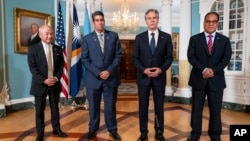More than six months after a crucial security deal between Washington and some Pacific Island nations was signed into law, key features of the Compacts of Free Association have not been implemented, raising questions in the region about U.S. commitment to its Pacific partners in the face of an increasingly assertive Beijing.
In March, the passage of the Compacts of Free Association, or COFA, extended $7 billion in economic aid over 20 years to three Pacific Island nations: Micronesia, Palau and the Marshall Islands. Additionally, COFA says Washington provides for their defense and can deny China access to their territorial waters, a maritime area larger than the continental United States.
Since then, however, some parts of the deal have yet to be implemented, including services and health benefits for veterans who live on the islands. Currently, veterans must travel to nearby islands such as Guam or as far away as Hawaii to get the help they need.
“The Biden-Harris administration has failed” to deliver veterans services to these Pacific Island nations, said Arkansas Republican Bruce Westerman, who is chair of the U.S. House of Representatives Natural Resources Committee, during an oversight hearing on COFA this week.
The U.S. State Department also has yet to establish a mandatory new office dedicated to diplomacy with the three islands.
In addition, Washington’s federal programs and services agreement with Palau has not been renewed, and the current agreement expires on September 30. Federal services in limbo range from welfare benefits and food stamp programs to the U.S. Postal Service and veterans’ health benefits.
“Many of our veterans living in Palau are suffering,” Hersey Kyota, Palau’s ambassador to the U.S., told the Indian and Insular Affairs Subcommittee in the oversight hearing, Tuesday. Palau is home to around 20,000 people; with that small population, it has the highest per capita rate of U.S. military volunteers.
Kyota said at least three Palauan veterans have died by suicide since January. “They need medication; they need to travel to Guam or Hawaii, but most of them do not have enough resources to pay for their own ticket,” he said.
Andrew Harding of the Heritage Foundation said the delays play to Beijing’s advantage.
“The implementation process is failing,” Harding told VOA. “If we really want to prove that we are the preferred partner in the Pacific, especially to our COFA partners, we can’t have these types of questions be raised.”
Greg Brown, a senior analyst at the Australian Strategic Policy Institute, said, “This doesn’t look good. Now, it’s hurry up and wait, and who are we waiting for? We're waiting for ourselves. We're waiting for the Americans."
At the hearing on Tuesday, Anka Lee, deputy assistant secretary of defense for East Asia, acknowledged the critical need for U.S. engagement with Palau, Micronesia and the Marshall Islands.
“We know that the PRC is aggressive. They are pushing very hard, and we have to compete with them toe to toe,” he said to lawmakers, using the acronym for China’s official name, the People’s Republic of China.
During the oversight hearing, Taylor Ruggles, the senior COFA adviser at the U.S. State Department, blamed some of the delay on communication issues between the White House and Congress and a focus on rolling out additional embassies in other Pacific Island nations such as Vanuatu. He said there’s an interagency meeting this week to get all the federal agencies together to move the process forward. That meeting, the second this year, is scheduled for Thursday. The first was held in April.
Dr. Miguel H. Lopez, assistant undersecretary for health at the U.S. Department of Veterans Affairs, said this week the department would “provide a comprehensive model of care” to Pacific veterans that is equal to treatment veterans receive in the continental United States.
Ambassadors to Palau, Micronesia and the Marshall Islands told lawmakers at the hearing that they received letters from the Veterans Administration Monday night, just hours before the oversight hearing.
“The [veterans] agreement calls for a one-year duration. We’re within six to seven months now, and we have not heard anything,” said Jack Soram, the Federated State of Micronesia ambassador to the United States.
“We don’t have that much time. Veterans need this help,” said Representative Ed Case, a Democrat from Hawaii.
